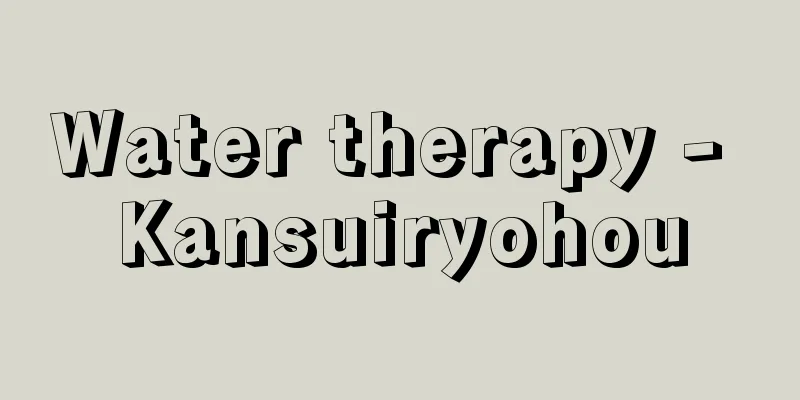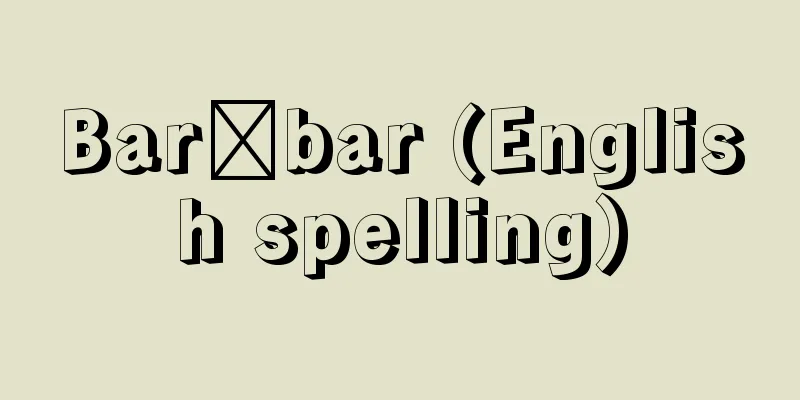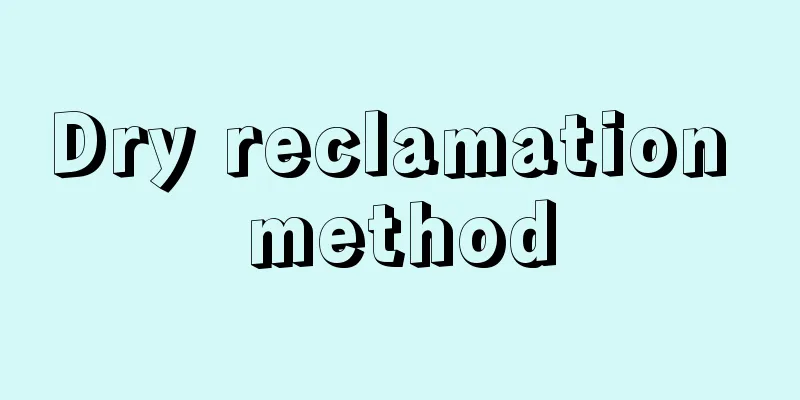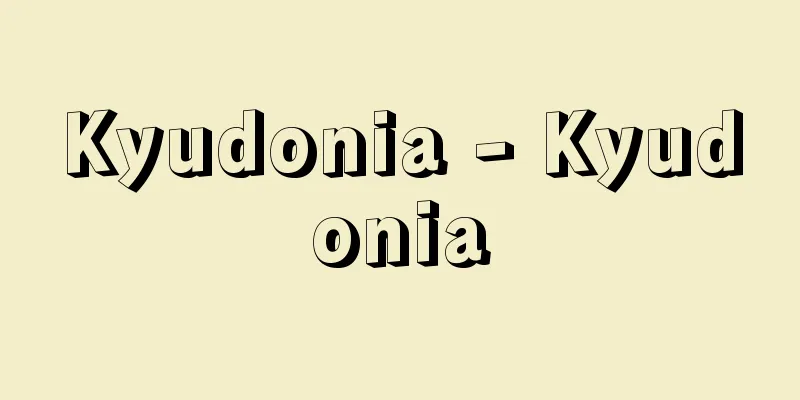Right of access
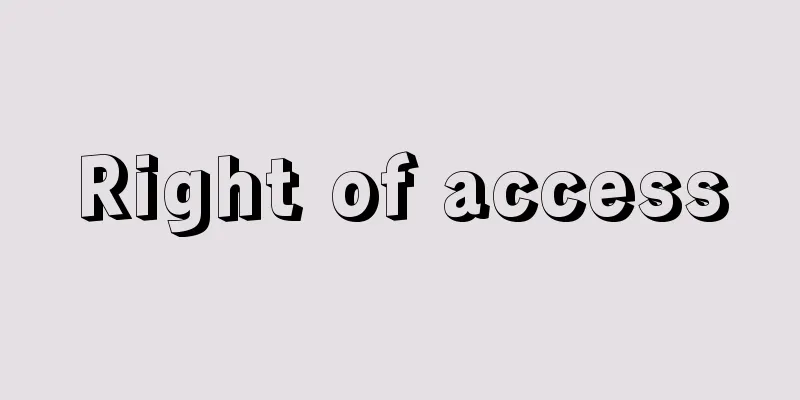
|
Here, we will mainly consider the concept of rights held by ordinary citizens regarding the mass media. Meaning and UsageThe concept of the right of access was recognized in British law from a relatively early period, but this right is usually used with an object after the "..." part, such as "right of access to ...". Examples of this usage are too numerous to list, such as the "right of access to beaches" (similar to the right to enter a beach in today's Japanese discussions), the "right of access to children" (the right to visit a child), and the "right of access to public records" (the right to inspect public records). However, in Japan today, the concept of access right is mainly discussed in terms of "mass media" or "information" as its object. In particular, the assertion of the "right of access to mass media" can be said to have raised interest in the term "right of access." Here, we will look at the creation and development of this right of access to mass media. [Masao Horibe] Right of access to the mass mediaIn modern society, freedom of speech means freedom of speech from the state, freedom to not have speech suppressed by the state, and tensions over freedom of speech existed between state power and the subjects of speech. This can be understood as a bipolar structure in freedom of speech. Here, the media and citizens have worked together to fight against the state's suppression of speech (the importance of freedom of speech in this sense must be emphasized even in modern times). However, in modern society, where the media has become massified, centralized, and increasingly monopolized with the development of capitalism, ordinary citizens have been alienated from the mass media, and two classes of information "senders" and "receivers" have been created, and moreover, the positions of the two have generally become incompatible, as seen in the relationship between capitalists and workers. Here, a certain rivalry has arisen between the media and citizens, who were originally considered to be one entity that enjoys freedom of speech, and the tensions over modern freedom of speech are considered to exist between the state, media, and citizens. This can be characterized as a shift from the previous bipolar structure of state vs. media = citizens to a tripartite structure of state vs. media vs. citizens. The rivalry between the media and citizens in this tripartite structure has taken various forms. For example, even if citizens, who are the original beneficiaries of freedom of speech, request the mass media, which is a means of mass communication, to convey their opinions in some form, the mass media may refuse access to the media, asserting their own freedom of speech and editorial and programming rights, and a sense of conflict arises between the two. As a result, citizens have begun to claim that they have the right to access the mass media and to demand that this be legally recognized. Among such rights of access, the right to reply is the right to request that the mass media publish or broadcast a rebuttal when it criticizes a particular person. Some foreign legislation and legal precedents recognize the right to request the correction of factual errors and the right to reply from the standpoint of fairness for broadcast media, which are distinct from print media. In Japan, the issue began to be discussed in various circles by the mid-1970s. Access rights to the mass media have been described as a Copernican revolution in traditional notions of freedom of speech. [Masao Horibe] "The Right of Access" by Masao Horibe (1977, University of Tokyo Press)" ▽ "What is the Right of Access" by Masao Horibe (Iwanami Shinsho)" ▽ "The Right of Access: For Whom is Freedom of Speech?" by J.A. Baron, translated by Hideo Shimizu, Masao Horibe, Kenshiro Okuda, and Fumiaki Shimazaki (1978, Nippon Hyoronsha)" [References] | | | | |Source: Shogakukan Encyclopedia Nipponica About Encyclopedia Nipponica Information | Legend |
|
ここでは主としてマス・メディアに対する一般市民の側の権利概念をさす場合を取り上げる。 意義と用法アクセス権という権利概念は、イギリス法では比較的早い時期から認められていたが、この権利は、「……へのアクセス権」right of access to ……というように、「……」の部分にその客体となる目的語を伴って使われるのが普通である。たとえば「なぎさへのアクセス権」right of access to beaches(今日の日本の議論でいえば、入浜(いりはま)権的なもの)、「子供へのアクセス権」right of access to children(子供との面接権)、「公的記録へのアクセス権」right of access to public records(公的記録閲覧権)など、その用例は枚挙にいとまがないといえる。 しかし、日本で、今日、アクセス権という概念で主として論じられているのは、その目的語として「マス・メディア」や「情報」を伴うものである。とくに、「マス・メディアへのアクセス権」right of access to mass mediaという主張が、アクセス権ということばへの関心を高めたとみてよいであろう。そこで、このマス・メディアへのアクセス権の生成や展開などについてみることにする。 [堀部政男] マス・メディアへのアクセス権近代社会における言論の自由は、国家からの言論の自由、国家によって言論を抑圧されない自由を意味し、言論の自由をめぐる緊張関係は、国家権力と言論主体との間に存在していた。これは、言論の自由における二極構造と把握することができる。ここでは、メディアと市民は一体となって国家による言論抑圧と闘ってきた(このような意味における言論の自由の重要性は、現代においても強調されなければならない)。ところが、資本主義の発展に伴って、メディアもマス化し、集中化し、独占化の傾向を強めるようになった現代社会においては、市民一般はマス・メディアから疎外され、情報の「送り手」と「受け手」という二つの階層が生まれるに至り、しかも、両者の間には、資本家と労働者の関係にみられるように、一般的には、立場の互換性がなくなってきている。ここでは、元来、言論の自由の享有主体として一体のものと考えられてきたメディアと市民の間に一定の対抗関係が生じるようになり、現代の言論の自由をめぐる緊張関係は、国家とメディアと市民の間に存しているとみられる。このことは、かつての国家対メディア=市民という二極構造から、国家対メディア対市民という三極構造への移行として特徴づけることができる。 この三極構造のなかのメディアと市民の間の対抗関係は、種々の形で出てきている。たとえば言論の自由の本来的享有主体である市民が、大量的な伝達手段であるマス・メディアに対して自己の意見をなんらかの形で伝達するよう要求しても、マス・メディアが自らの言論の自由や編集権、編成権を主張して、市民のアクセスを拒絶することがあるので、両者の間に対立意識が生まれることになる。そこで、市民の側がマス・メディアへアクセスする権利があると主張して、これを法的に承認するよう求めるようになった。そのようなアクセス権のうち、とくに、マス・メディアが特定の者を批判するような場合に、それに対する反論を掲載、放送するよう要求する権利が反論権right of replyである。諸外国の立法例や判例のなかには、事実の誤りの訂正を求める権利や印刷メディアとは区別される放送メディアについて公平の見地から反論権などを認めているものもある。日本では、1970年代中葉に至って各方面で議論されるようになった。マス・メディアのアクセス権は、従来の言論の自由の観念に対してコペルニクス的転回を迫るものであると評されている。 [堀部政男] 『堀部政男著『アクセス権』(1977・東京大学出版会)』▽『堀部政男著『アクセス権とは何か』(岩波新書)』▽『J・A・バロン著、清水英夫・堀部政男・奥田剣志郎・島崎文彰訳『アクセス権――誰のための言論の自由か』(1978・日本評論社)』 [参照項目] | | | | |出典 小学館 日本大百科全書(ニッポニカ)日本大百科全書(ニッポニカ)について 情報 | 凡例 |
Recommend
Iturup [island] - Iturup
...The main industry was fishing, but the island ...
Linear motor car - ri-na-mo-ta-ka- (English spelling) linear motor car
A vehicle driven by a linear motor. A linear moto...
Płock (English spelling)
A city in the Masovian Voivodeship in central Pol...
Robinson, E.
...It covers a long period from prehistoric times...
Ninnaji Temple
Located in Omuro Ouchi-cho, Ukyo-ku, Kyoto City, ...
Prince Takechi
Year of death: July 10, 10th (August 13th, 696) Ye...
Yin Yuanliang
Year of death: 29 March 16 (27 April 1767) Year of...
Private tutor - KATEIKYOSHI
A teacher who provides one-on-one instruction to ...
Pitys
...Pine cones, pine needles, and pine bark are al...
Père David's deer (English spelling)
A mammal of the Cervidae family in the order Artio...
Local Assembly - Chihogikai
A deliberative and decision-making body establish...
Masachika Ichikawa
...Shindenmura was developed in December 1626 (Ka...
Attack power - Gekiryoku
The force that two objects exert on each other whe...
Jean Valjean
The protagonist of the novel Les Miserables (1862)...
Detective Son - Shosokushi
Also called a probe. An instrument used to examine...
